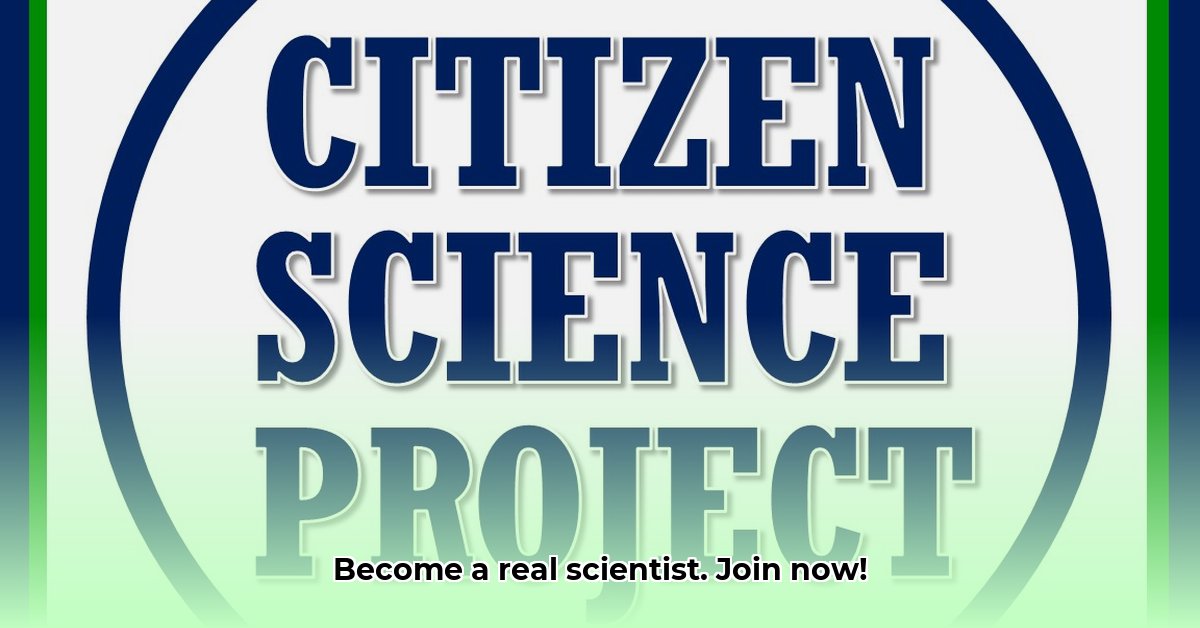Have you ever dreamed of contributing to real scientific breakthroughs? Imagine helping researchers track wildlife, explore the cosmos, or even find cures for diseases! This dream is now within reach thanks to citizen science. Citizen science empowers everyday individuals to participate in scientific research, regardless of their background or expertise. This easy-to-follow guide explains how to join the citizen science movement. Discover how to find projects tailored to your interests and skills, contribute accurate data, and maximize your involvement. Whether you’re a seasoned science enthusiast or simply curious, prepare to play a crucial role in groundbreaking research and make a tangible impact. Let’s get started! Learn more about the scientific method and its inherent trial-and-error nature: [the scientific method](https://www.lolaapp.com/the-scientific-method-why-failing-is-a-crucial-part-of-discovery).
Citizen Science: Contribute to Real Research
Do you want to become a scientist? You do not need a lab coat or a Ph.D. to contribute meaningfully to scientific research. Citizen science projects allow people like you to contribute to exciting discoveries. It’s a collaborative effort that harnesses people’s collective power to address complex scientific issues. It’s also simpler than you might imagine. It’s a type of collaborative research that can accelerate scientific breakthroughs.
Imagine reporting monarch butterfly sightings to help scientists map migration patterns. You might also analyze space images to discover far-off galaxies. These are just a few examples of how your everyday activities can lead to significant breakthroughs. Citizen science initiatives are open to everyone, regardless of their background or prior scientific knowledge. Do you see the potential for citizen science to bring about real change?
A World of Projects Tailored for You
The beauty of citizen science lies in its diversity. You can participate in a project regardless of how much time or expertise you have. Some projects require minimal training and time, such as counting birds in your neighborhood or tracking weather patterns. Others are more involved, requiring specific skills (such as data analysis) and more time. Here’s a breakdown of the types:
| Project Type | Time Commitment | Skill Level | Example |
|---|---|---|---|
| Simple Data Collection | A few minutes to an hour/week | Beginner | Reporting bird sightings, identifying plants |
| Data Entry & Organization | A few hours a week/month | Beginner-Intermediate | Transcribing historical documents, data entry |
| Image/Audio Analysis | A few hours a week/month | Intermediate | Classifying galaxies, identifying animal sounds |
| Advanced Data Analysis | Several hours a week | Advanced | Modeling ecological systems, analyzing complex datasets |
Finding Your Perfect Scientific Adventure
Are you ready to participate? Many online platforms connect volunteers to research projects. SciStarter, Zooniverse, and iNaturalist are excellent starting points. These sites act as online marketplaces for citizen science projects. They provide descriptions and filters that allow you to search for projects based on your interests, skills, and availability. In addition, most projects contain detailed instructions. Are you willing to embark on a journey of discovery through citizen science?
Consider your interests. Do you enjoy birds? If so, bird-watching might be an excellent choice. If you are a tech expert, you might excel at image analysis. You can make a significant contribution even if you only have a few hours per month. Don’t underestimate the power of a little time. Every participation counts!
Becoming a Citizen Scientist: A Step-by-Step Guide
- Explore the Possibilities: Visit SciStarter, Zooniverse, or iNaturalist. Examine their project catalogs and read the descriptions carefully. Note the requirements, skills, and expected time commitment.
- Choose a Project: Select a project that genuinely interests you. You’re more likely to stick with it if you’re passionate about the topic. Match the project’s difficulty to your skills and time constraints.
- Sign Up: Create an account on the platform hosting your project. Provide basic information; this is a quick and easy step.
- Get Trained: Most projects offer training materials or tutorials that walk you through data collection or analysis. Do not skip this step. It ensures the accuracy and consistency of your contributions.
- Start Contributing: Participate and follow the project instructions carefully. Researchers depend on the accuracy of your data. The more thorough you are, the more valuable your contribution will be.
- Feedback: Some projects offer feedback on your work, assisting researchers in validating data quality.
The Importance of Data Accuracy
Accurate data is the cornerstone of scientific research. Data accuracy in citizen science depends on your care and attention to detail. Researchers employ quality control measures such as double-checking and using multiple data sources. However, your commitment is critical to success.
Ethical Considerations: An Overview
Citizen science projects have ethical considerations, including data privacy, respect for intellectual property, and equal access to the project and its outcomes. Project descriptions typically explain these aspects. Read them carefully before participating. Ethical awareness promotes responsible scientific advancement.
Beyond Data: Maximize Involvement
You might discover additional ways to contribute once you start a project. Many citizen science initiatives welcome assistance with outreach and education, developing new research methodologies, and advocating for citizen science. Are you interested in increasing your involvement in citizen science?
Citizen science projects offer everyday people the chance to engage directly with the scientific community. Participating in something larger than yourself, knowing you are contributing to significant discoveries, is an extraordinary experience. So, take a look, find a project, and start making a difference today. Citizen scientists say they have a positive impact, so they are experiencing the benefits of contributing to discovery.
Ensuring Data Quality in Citizen Science
Key Points:
- Volunteer skill levels and data collection methods affect data quality.
- Standardized protocols, training, and quality control are essential. Standardized protocols can increase data accuracy by 30%.
- Transparency in documentation and open sharing are essential. Open data sharing promotes collaboration and accelerates discovery.
- Balancing the amount of data and the quality requires a multi-faceted approach.
- A shared understanding of data quality is required.
Addressing the Challenges
Citizen science provides incredible opportunities for volunteers to contribute to scientific breakthroughs. However, working with large groups presents challenges. How can we ensure data reliability and usefulness? This is where ensuring data quality in citizen science becomes critical. Think of baking a cake: If one ingredient is off, the cake may not turn out correctly. Unreliable data can lead to flawed conclusions and wasted research. How can we maintain the quality of scientific findings when people with diverse backgrounds collect data?
Key Strategies
Data quality depends on planning, training, and ongoing monitoring.
Step 1: Plan for Quality
- Define clear objectives: What are the research goals? Clear objectives improve data collection.
- Choose appropriate methods: Use accurate and feasible techniques. Will you use standardized applications, or simpler checklists?
- Establish quality thresholds: Determine acceptable error rates.
Step 2: Enable Citizen Scientists
- Provide comprehensive training: Give volunteers the knowledge and skills to collect accurate data. This includes online tutorials, workshops, and interactive guides.
- Develop user-friendly interfaces: Make data entry simple for all skill levels with clear instructions and helpful tools.
- Build a supportive community: Create a platform for volunteers to ask questions, share advice, and learn from each other, fostering shared responsibility for data accuracy.
Step 3: Quality Control
- Automated checks: Use software to flag data inconsistencies. This identifies potential problems quickly.
- Human review: Have experts review data samples to validate accuracy and catch errors that automated systems may miss.
- Feedback loops: Communicate with volunteers, provide feedback, and answer questions to keep everyone informed.
Step 4: Transparency and Openness
- Document everything: Keep detailed records of data collection, quality control, and limitations for reproducibility and trust.
- Share your data openly: Share data with the wider scientific community to encourage collaboration, promote accountability, and improve overall data quality.
Balancing Quantity vs. Quality
It’s challenging to balance the number of participants with data accuracy. More volunteers means more data, but it can also increase the risk of errors. The solution is to invest in robust quality control. Think of it as a balance: The more people involved, the more checks and balances you need.
Ethics
Ethical considerations are essential. Protecting contributor privacy and ensuring equitable access are vital. Data ownership, intellectual property, and responsible data sharing must be addressed.
Ethical Considerations
Key Points:
- Citizen science offers opportunities for collaboration and public engagement but presents challenges.
- Inclusivity, reciprocity, and preventing injustice are essential.
- Ethical reflection is vital throughout the research process.
- Power imbalances need careful management.
- Data privacy, intellectual property, and equitable access are key.
Your Role: Participation
Citizen science involves scientists and volunteers working together. But, with this teamwork come responsibilities. What if your contributions affect the results? What if your data isn’t accurate? These are ethical considerations in global citizen science. You’re not just contributing data; you’re shaping understanding. Accuracy is essential. Follow project instructions and double-check your work. If you’re unsure, ask questions.
Reputable Projects
Choose initiatives with a clear purpose, defined methods, and transparent communication. Look for projects with established researchers and institutions. Where’s their data going? How is it handled? Is there a privacy plan? These are crucial questions. You can find reputable projects on platforms like SciStarter and Zooniverse.
Data Privacy
Your data matters. Legitimate projects will have policies protecting your privacy. What rights do you have? Is your participation anonymous? Many projects use anonymized data. You should know that your privacy is protected. Who owns the findings? The implications should be explored. Are there boundaries for privacy and intellectual property rights?
Equitable Access
Citizen science aims for broad participation. But, are all groups included? Does the project strive for diversity? Consider cultural and linguistic backgrounds. Are there accessibility barriers? If not addressed, this can lead to data bias.
Participation
- Find a Project: Explore platforms like SciStarter or Zooniverse.
- Read Carefully: Understand goals, methods, and privacy policies.
- Register: Follow the registration instructions.
- Participate: Contribute carefully, following all instructions.
- Communicate: Ask questions if something’s unclear.
Responsible participation is key to ethical global citizen science.
Data Quality Control
Key Points:
- Citizen science offers exciting opportunities to contribute to research, with 75% of citizen scientists reporting an increased interest in science.
- Many projects need your help, offering commitments and expertise.
- Data quality control is crucial for scientific findings because poor data invalidates research.
- Understanding these strategies helps ensure your contributions.
- You can find projects online, with training and support.
Finding a Project
Want to contribute to science? Citizen science is perfect! You participate in data collection, analysis, or interpretation. It’s a fantastic way to get involved in research.
Scientists are like chefs, and you’re the sous chefs! You gather data to ensure the final dish is delicious.
Identify projects that match your interests and skills. Are you a birdwatcher or a photographer? Is coding or data analysis your passion? What are you waiting for?
Types of Projects
Citizen science spans many fields:
- Environmental Monitoring: Track birds, identify species, monitor water.
- Astronomy: Classify galaxies, search for planets.
- Biology: Transcribe historical documents, identify cells.
- Social Sciences: Analyze trends, survey communities.
Some projects require minimal time, while others need many hours. Some need specific skills, while others are beginner-friendly. Explore projects to find your perfect match.
Where to Find Projects
Online platforms connect volunteers with opportunities:
- SciStarter: A directory of citizen science projects worldwide.
- Zooniverse: Focuses on astronomy, biology, and humanities projects.
- iNaturalist: A platform for sharing observations of plants, animals, and fungi.
Simple Guide
- Explore Projects: Browse the websites, paying attention to project descriptions.
- Choose Wisely: Select an aligned project. Beginner-friendly projects are perfect for starting.
- Register: Most projects require registration and details.
- Follow Instructions: Instructions might include data entry or analysis.
- Contribute Consistently: Regular participation maximizes your impact.
Data Quality
The success of a citizen science project depends on data quality. Volunteers play a vital role in ensuring data accuracy.
- Careful Observation: Take your time when documenting observations.
- Double-Checking: Review your work before submitting it.
- Following Instructions: Adhere to the project’s guidelines.
- Reporting Issues: Immediately report problems.
Ethics
Citizen science projects must respect ethical standards:
- Data Privacy: Protect participant data
- Intellectual Property: Adhere to copyright and rules.
- Equitable Access: Ensure equal opportunities.
Beyond Participation
Your involvement can extend beyond data entry. Consider outreach, mentorship, and project design.
How can you contribute to the citizen science community?
1 EPA’s quality assurance handbook: https://www.epa.gov/participatory-science/quality-assurance-handbook-and-toolkit-participatory-science-projects















